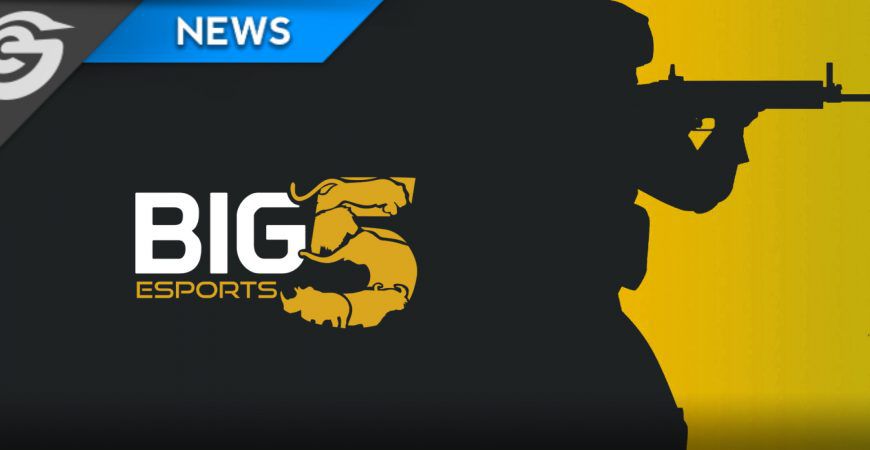Interview with Big5’s CS:GO Coach maniaq
Something that South African CS desperately lacks is coaches. Big5 Esports was the only team top flight team throughout 2019 to field a coach consistently. To get a better idea of a coach’s role I asked Richard “maniaq†Brown a few questions. He offered some great insight into the life of a coach, ranging from his job in scrims and officials to conflict resolution to characteristics required to make a good coach.Â
Q&A with maniaq
MS: How did you get into esports and then specifically coaching?
RB: I am a very competitive person so that’s always drawn me to esports. I initially started playing CS 1.6 back in the day, but then stopped when that kind of died out. I then started playing CSGO competitively in 2015 and continued to play until the end of 2018. Throughout my playing career I’d always been IGL and always really enjoyed the in-depth tactical side of the game. So when I decided to stop playing, I felt that coaching would be a nice way to stay involved and scratch that competitive itch and being that coaching and IGLing share a similar skill set, I thought it made sense.
MS: How do you prepare for a big match? Â
RB: Given that I’m not doing this full-time, I try prepare as much as time allows. When possible I will try check out demos of the opponents to look at the way they play. Things I would look for would be like, what are the defaults they run, how do they react when a player dies, what set-plays do they use and what are some telltale signs for them and other things like that. I think the focus though is more on the way we play rather than the way other teams play. It is good to be aware of the way certain opponents play, but only in so much as to know what in our wheel-house will work best.
MS: How do you feel about the current rules in terms of coaches and communicating with players Â
RB: Referring to only being allowed to speak in timeouts, I think it’s fine. I really don’t have a problem with it, I think it should be primarily the five players on the server that should be required to make decisions in the moment. Most of the work that a coach does is all in the preparation and trying to build habits that lead to good decision making by the players.
MS: During a match where does your focus lie?Â
RB: Generally speaking, I would be focused on figuring out solutions to problems that we may be having. If I notice that certain things aren’t working or could be done better vs that opponent, I would be thinking about how I could portray that to the team in the next timeout. Sometimes it’s clear what we should do, other times not. So I really just focus on thinking about what I could say at that moment that would best help the team.
MS: Knowing you only have 30 seconds (length of a tac pause) to portray your thoughts, how do you get all your information across? Â
RB: It kind of depends on the situation, sometimes it can be hard to get everything across. I think the key is to not go too much into what the opponents are doing and trying to describe that, but rather say what we should be doing. Like if I notice something that they are doing, I’d rather spend the time just explaining what I think we should be doing to counter it. So I would just give recommendations as to what we should be doing in these scenarios. You also have time to think about it as you are watching, so before you decide to call the tac pause you have had time to think about exactly what you want to say.
MS: What are some of the key values a coach brings to a team?Â
RB: I think having someone who is in some ways separate from the players helps. As a figure of authority and as an outside set of eyes. You can see things that players may not notice when they are playing the game, as well as being able to see all perspectives of a situation. It also really helps get everyone on the same page of how the team wants to play, in terms of like, mediating arguments that players may have with each other. You can be objective and view both sides of it and I feel that it’s far easier to come to a solution when the players are hearing it from a coach, rather than just another player.Â
MS: When emotions are flying high, how do you stabilize the team?Â
RB: I wouldn’t say that we have had too much of an issue with this in Big5. We all understand that once the round is over, it’s done and onto the next round. In certain scenarios though, I feel that taking a pause just to reassure everyone that we are on the right path and that we did the right thing and made the right decisions can help, even if we ended up losing the round. I think that can help the team’s morale in those moments. Or if I feel that Konvict doesn’t really have a clear idea, or is too caught up in the moment to make a good call, then I will just step in and call what we should do in that round. As I said though, we haven’t really had this problem, most of the time just taking a pause and making sure we are all 100% clear on what we are going to be doing on the next round is enough.
MS: What is your role during scrims? Â
RB: I would say it’s mainly trying to ensure that the team is practicing what we are supposed to be practicing. Keeping everyone focused on whatever it is that we set out to practice in that scrim. That and making sure that everyone is doing what they should be doing. This could be reminding players of equipment usage or incorrect decision making. Basically just ensuring that what we discussed in practice is actually being done in the scrim.
MS: How do you as a coach enhance your skills from an individual perspective? Like a player shoots bots or plays retake, what can you do as a coach?Â
RB: I guess it really is just watching more CS. Watching how other teams do certain things or handle certain situations. So I would say, watching and thinking about CS as much as possible.
MS: What are the characteristics required to make a good coach?
RB: Having a very good understanding of the game is a must, of course, but I think being able to articulate your ideas and views is also very important. You need to be able to manage people and really be able to get all five players onto the same page. There are different ways of playing and players will have different opinions about how they want to handle every scenario, so as a coach you need to be able to bring the players around to a similar way of thinking about the game.





